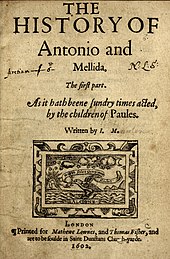
The Merchant of Venice is a play by William Shakespeare, believed to have been written between 1596 and 1598. A merchant in Venice named Antonio defaults on a large loan taken out on behalf of his dear friend, Bassanio, and provided by a Jewish moneylender, Shylock, with seemingly inevitable fatal consequences.
What You Will is a late Elizabethan comedy by John Marston, written in 1601 and probably performed by the Children of Paul's, one of the companies of boy actors popular in that period.

The Revenger's Tragedy is an English-language Jacobean revenge tragedy which was performed in 1606, and published in 1607 by George Eld. It was long attributed to Cyril Tourneur, but "The consensus candidate for authorship of The Revenger’s Tragedy at present is Thomas Middleton, although this is a knotty issue that is far from settled."

Antonio's Revenge is a late Elizabethan play written by John Marston and performed by the Children of Paul's. It is a sequel to Marston's comic play Antonio and Mellida, and it chronicles the conflict and violence between Piero Sforza, the Duke of Venice, and Antonio, who is determined to take revenge against Piero for the death of his father and the slander of his fiancée. While it has much in common with other revenge tragedies , it is sometimes read as a hyperbolic parody of the genre.

The Malcontent is an early Jacobean stage play written by the dramatist and satirist John Marston ca. 1603. The play was one of Marston's most successful works. It is widely regarded as one of the most significant plays of the English Renaissance; an extensive body of scholarly research and critical commentary has accumulated around it.

Parasitaster, or The Fawn is an early Jacobean play, written by the dramatist and satirist John Marston, probably in 1604, and performed by the Children of the Queen's Revels in the Blackfriars Theatre.
The Phoenix is a Jacobean play, a city comedy written by Thomas Middleton c. 1603–4, and performed by the Children of Paul's. It may be Middleton's earliest surviving play.
The Constant Maid, or Love Will Find Out the Way is a Caroline era stage play, a comedy written by James Shirley and first published in 1640.
The Gentleman of Venice is a Caroline era stage play, a tragicomedy written by James Shirley, and first published in 1655.
The Renegado, or The Gentleman of Venice is a late Jacobean stage play, a tragicomedy written by Philip Massinger and first published in 1630. The play has attracted critical attention for its treatment of cultural conflict between Christian Europe and Muslim North Africa.
The Bashful Lover is a Caroline era stage play, a tragicomedy written by Philip Massinger. Dating from 1636, it is the playwright's last known extant work; it appeared four years before his death in 1640.
Women Pleased is a late Jacobean era stage play, a tragicomedy by John Fletcher that was originally published in the first Beaumont and Fletcher folio of 1647.

The Gentleman Usher is an early 17th-century stage play, a comedy written by George Chapman that was first published in 1606.
May Day is an early 17th-century stage play, a comedy written by George Chapman that was first published in 1611.
Albumazar is a Jacobean era play, a comedy written by Thomas Tomkis that was performed and published in 1615.
The Novella is a Caroline era stage play, a comedy written by Richard Brome. It was first published in the 1653 Brome collection Five New Plays, issued by the booksellers Humphrey Moseley, Richard Marriot, and Thomas Dring.
The Insatiate Countess is an early Jacobean era stage play, a tragedy first published in 1613. The play is a problematic element in John Marston's dramatic canon.

The Merchant of Venice is a 1923 German silent drama film directed by Peter Paul Felner and starring Werner Krauss, Henny Porten and Harry Liedtke. The film is an adaptation of William Shakespeare's play The Merchant of Venice. It was released in the United States in 1926 as The Jew of Mestri. The film was made on location in Venice, with scenes and characters added which were not in the original play. This is the surviving copy, being two reels shorter than the German version. The characters in the German retained Shakespeare's nomenclature, but in the American they were given new names sourced from the Italian work Il Pecorone, a 14th-century short story collection attributed to Giovanni Fiorentino, from which Shakespeare is believed to have drawn his idea. The film purports to be a return to the original, as an excuse for its differences from the play.







